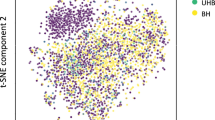Abstract
The adoption of predictive modeling for clinical decision support is accelerating in healthcare, however, the need for large sample sizes puts smaller health systems at a disadvantage. Small health systems have insufficient positive cases to build models are left with three choices. First, they can obtain already trained models, which are often too generic. Second, they can participate in research networks, building a model through a network-wide data set. Since small hospitals can only contribute small amounts of data influencing the resulting shared model minimally, this approach yields only minimal specialization. The third option is transfer learning, where a model previously trained on a large population is refined to the specific population, which carries the danger of over-specializing to the idiosyncrasies of the small data set. In this paper, we present a novel paradigm, consensus modeling, that allows a small health system to collaborate with a larger system to build a model specific to the smaller system without sharing any data instances. The method is similar to transfer learning in that it refines models from the larger system to be specific to the small system, but through iterative refinement, the larger system alleviates the risk of over-specializing to the small system. We evaluated the approach on predicting postoperative complications at two health systems with 9,044 and 38,545 patients. The model obtained from the proposed consensus modeling paradigm achieved a predictive performance on the small system that is as good as the transfer learning approach (AUC 0.71 vs 0.71) but significantly outperformed the transfer learning approach on the large dataset (AUC 0.80 vs 0.65) suggesting significantly reduced over-specializing.
Access this chapter
Tax calculation will be finalised at checkout
Purchases are for personal use only
Similar content being viewed by others
References
Aliferis, C.F., Tsamardinos, I., Statnikov, A.: Hiton: a novel Markov blanket algorithm for optimal variable selection. In: AMIA Annual Symposium Proceedings, vol. 2003, p. 21. American Medical Informatics Association (2003)
Beam, A.L., Manrai, A.K., Ghassemi, M.: Challenges to the reproducibility of machine learning models in health care. JAMA (2020)
Henderson, W.G., Daley, J.: Design and statistical methodology of the national surgical quality improvement program: why is it what it is? Am. J. Surg. 198(5), S19–S27 (2009)
Kairouz, P., et al.: Advances and open problems in federated learning. arXiv preprint arXiv:1912.04977 (2019)
Korol, E., et al.: A systematic review of risk factors associated with surgical site infections among surgical patients. PloS One 8(12) (2013)
Li, Q., Wen, Z., He, B.: Federated learning systems: vision, hype and reality for data privacy and protection. arXiv preprint arXiv:1907.09693 (2019)
Liu, Y., Chen, T., Yang, Q.: Secure federated transfer learning. arXiv preprint arXiv:1812.03337 (2018)
Ma, S., Statnikov, A.: Methods for computational causal discovery in biomedicine. Behaviormetrika 44(1), 165–191 (2017). https://doi.org/10.1007/s41237-016-0013-5
McMahan, H.B., Moore, E., Ramage, D., Hampson, S., et al.: Communication-efficient learning of deep networks from decentralized data. arXiv preprint arXiv:1602.05629 (2016)
Pessaux, P., Msika, S., Atalla, D., Hay, J.M., Flamant, Y.: Risk factors for postoperative infectious complications in noncolorectal abdominal surgery: a multivariate analysis based on a prospective multicenter study of 4718 patients. Arch. Surg. 138(3), 314–324 (2003)
Phillips, J., O’Grady, H., Baker, E.: Prevention of surgical site infections. Surgery (Oxford) 32(9), 468–471 (2014)
Reddi, S., et al.: Adaptive federated optimization. arXiv preprint arXiv:2003.00295 (2020)
Tourani, R., Murphree, D.H., Melton-Meaux, G., Wick, E., Kor, D.J., Simon, G.J.: The value of aggregated high-resolution intraoperative data for predicting post-surgical infectious complications at two independent sites. In: 17th World Congress on Medical and Health Informatics, MEDINFO 2019, pp. 398–402. IOS Press (2019)
U.S. Agency for Healthcare Research and Quality: Clinical Classifications Software (CCS) for ICD-9-CM & ICD-10-CM/PCS (2019). https://www.hcup-us.ahrq.gov/toolssoftware/ccs10/ccs10.jsp
Wang, H., Yurochkin, M., Sun, Y., Papailiopoulos, D., Khazaeni, Y.: Federated learning with matched averaging. arXiv preprint arXiv:2002.06440 (2020)
Weiss, K., Khoshgoftaar, T.M., Wang, D.D.: A survey of transfer learning. J. Big Data 3(1), 1–40 (2016). https://doi.org/10.1186/s40537-016-0043-6
Xu, J., Wang, F.: Federated learning for healthcare informatics. arXiv preprint arXiv:1911.06270 (2019)
Acknowledgement
This work was supported in part by NIGMS award R01 GM 120079, AHRQ award R01 HS024532, and the NCATS University of Minnesota CTSA UL1 TR002494. The views expressed in this manuscript are those of the authors and do not necessarily reflect the views of the funding agencies.
Author information
Authors and Affiliations
Corresponding author
Editor information
Editors and Affiliations
Rights and permissions
Copyright information
© 2020 Springer Nature Switzerland AG
About this paper
Cite this paper
Tourani, R. et al. (2020). Consensus Modeling: A Transfer Learning Approach for Small Health Systems. In: Michalowski, M., Moskovitch, R. (eds) Artificial Intelligence in Medicine. AIME 2020. Lecture Notes in Computer Science(), vol 12299. Springer, Cham. https://doi.org/10.1007/978-3-030-59137-3_17
Download citation
DOI: https://doi.org/10.1007/978-3-030-59137-3_17
Published:
Publisher Name: Springer, Cham
Print ISBN: 978-3-030-59136-6
Online ISBN: 978-3-030-59137-3
eBook Packages: Computer ScienceComputer Science (R0)




